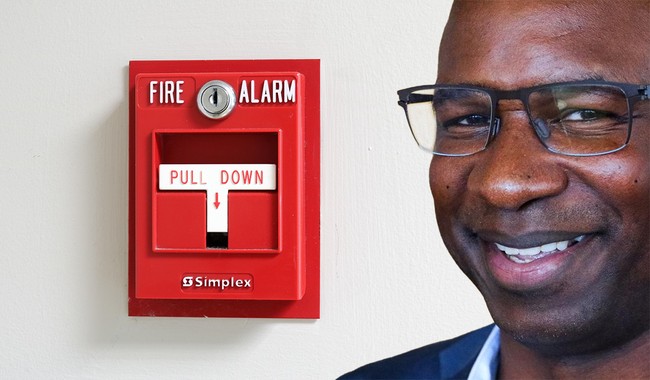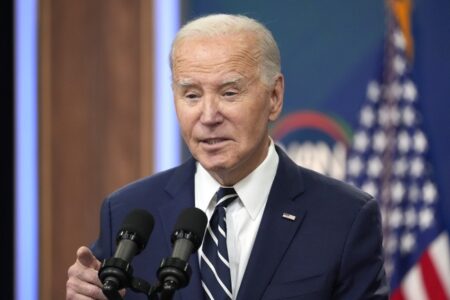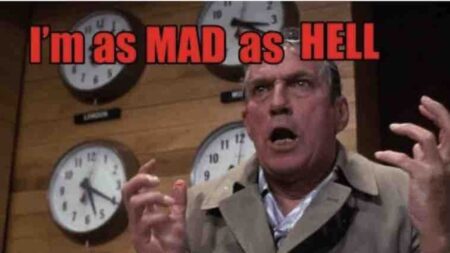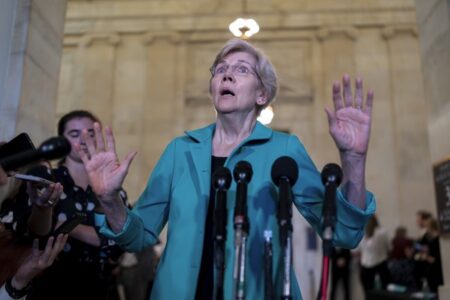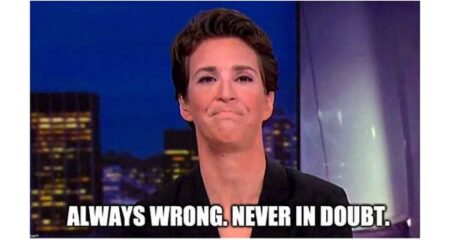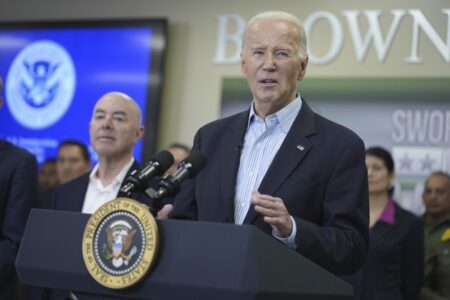The headline promises that there is something funny that happened today, but bluntly it takes a bit of context to get to it. But we honestly laughed when we heard about it, and you might, too. After all, just because you have to have someone explain something to you to get the joke, doesn’t mean it can’t be funny.
And we are also talking about serious stuff, here. We can do both—have fun and be serious—in the same piece, right?
We glancingly mentioned it earlier, but today the Supreme Court heard oral arguments in Fischer v. United States, which concerns the interpretation of a law prohibiting obstruction of official proceedings. This case is important because many of people charged in relationship to January 6 have been charged with that, including that specific defendant, Joseph Fischer. Also it is one of the charges being faced Donald Trump in his D.C. case. In other words, while Trump isn’t a party to this case, what The Supreme Court says about this law might effectively nuke part of Trump’s case for the prosecution.
We won’t do a full deep dive on this argument at the moment, but we think we should provide enough context to help you understand what is going on. It is common and reasonable for the government to have laws the protect its ability to run things. In an extreme example, imagine if 50 people stormed the capital with machine guns and took over Congress for a week. That would mean that the will of the people who actually voted for these Congresspersons would be thwarted by just 50 people, as Congress would not be able to get anything done. There is no reasonable question that Congress can pass laws criminalizing that kind of behavior, if it is otherwise constitutional.
The law at issue in this case—one of many dealing with obstruction of official proceedings—is 18 U.S.C. § 1512(c)(2) and it says:
(c) Whoever corruptly—
(1) alters, destroys, mutilates, or conceals a record, document, or other object, or attempts to do so, with the intent to impair the object’s integrity or availability for use in an official proceeding; or
(2) otherwise obstructs, influences, or impedes any official proceeding, or attempts to do so,
shall be fined under this title or imprisoned not more than 20 years, or both.
Of course, one might naturally wonder what they mean by ‘official proceeding.’ That definition is provided in 18 U.S.C. § 1515(a) which says:
Recommended
(1) the term ‘official proceeding’ means—
(A) a proceeding before a judge or court of the United States, a United States magistrate judge, a bankruptcy judge, a judge of the United States Tax Court, a special trial judge of the Tax Court, a judge of the United States Court of Federal Claims, or a Federal grand jury;
(B) a proceeding before the Congress;
(C) a proceeding before a Federal Government agency which is authorized by law; or
(D) a proceeding involving the business of insurance whose activities affect interstate commerce before any insurance regulatory official or agency or any agent or examiner appointed by such official or agency to examine the affairs of any person engaged in the business of insurance whose activities affect interstate commerce;
That would seem to cover the certifying of the results on January 6, 2021. The question before the Supreme Court is how this law is to be interpreted. Therefore, the Constitution is not directly involved. Despite this, judging by this reporting from Turley, the Supreme Court seems to have two First Amendment concerns. The first is that in theory many forms of valid protest might be swept into this. And this can be validly part of the discussion because the Supreme Court has long said it would avoid an interpretation of a statute that is dubious under the Constitution—although there are normally limits in how far the Supreme Court will go to do so.
The second First Amendment issue is that the government is forbidden from engaging in viewpoint discrimination. We mentioned this case in our last post, but the Supreme Court’s opinion in RAV v. St. Paul, 505 U.S. 377 (1992) is one of the better explanations of this principle. That case dealt with a law that made it illegal to put up certain ‘hate symbols,’ the law saying:
Whoever places on public or private property a symbol, object, appellation, characterization or graffiti, including, but not limited to, a burning cross or Nazi swastika, which one knows or has reasonable grounds to know arouses anger, alarm or resentment in others on the basis of race, color, creed, religion or gender commits disorderly conduct and shall be guilty of a misdemeanor.
A person was convicted under this law for basically burning a cross and it came to the Supreme Court. The late, great Justice Scalia explained why this law was unconstitutional, saying in part that:
In its practical operation, moreover, the ordinance goes even beyond mere content discrimination, to actual viewpoint discrimination. Displays containing some words— odious racial epithets, for example—would be prohibited to proponents of all views. But ‘fighting words’ that do not themselves invoke race, color, creed, religion, or gender— aspersions upon a person’s mother, for example—would seemingly be usable ad libitum in the placards of those arguing in favor of racial, color, etc., tolerance and equality, but could not be used by those speakers’ opponents. One could hold up a sign saying, for example, that all ‘anti-Catholic bigots’ are misbegotten; but not that all ‘papists’ are, for that would insult and provoke violence ‘on the basis of religion.’ St. Paul has no such authority to license one side of a debate to fight freestyle, while requiring the other to follow Marquis of Queensberry rules.
For those who don’t know, ‘Marquis of Queensberry rules’ is a reference to more or less the modern rules of boxing.
So, we have seen a Federal Government that has treated some riots or obstruction very differently than others. For instance, on January 20, 2017, there was a riot in Washington D.C. on Trump’s (first) Inauguration Day. A lot of people don’t know about it, the media didn’t generally call it a riot, but we inside the D.C. region remember. This was a riot plainly designed to prevent Trump from taking the oath of office and, therefore, a riot designed to prevent the peaceful transfer of power. Yet there were no Congressional hearings, no FBI dragnet and none of the people arrested were convicted—most of them had their charges dropped. So much for the protection of ‘Democracy.’
That all being said, that concern about viewpoint discrimination doesn’t feed very easily into the analysis of the statute. The problem isn’t that the statute discriminates based on politics—it doesn’t—but that the people enforcing the law plainly do. Still, that definitely seemed to be on the justices’ minds during Oral Argument. So as usual, Jonathan Turley was live posting during the argument and this is what he posted, starting with Fischer’s lawyer:
…Justice Sotomayor was quick out of the gate to pursue a tough line of questioning for the defense counsel on why the broader meaning is warranted…
— Jonathan Turley (@JonathanTurley) April 16, 2024
…Justice Jackson has also questioned counsel closely on the use of “evidence” as a term since it does not appear in the actual provisions…
— Jonathan Turley (@JonathanTurley) April 16, 2024
…The government is now up with its case…
— Jonathan Turley (@JonathanTurley) April 16, 2024
…Roberts is not buying the government’s argument on getting around prior cases including one just issued on Friday. I have great respect for Prelogar but she is struggling on this point…
— Jonathan Turley (@JonathanTurley) April 16, 2024
…The exchange has brought out Justice Gorsuch who is pressing on what “otherwise” really means under the government’s view. Gorsuch is asking if a heckler at the State of the Union qualify. Ironically, that is precisely the hypothetical that we struggled with in my Supreme…
— Jonathan Turley (@JonathanTurley) April 16, 2024
The cut off text reads:
Ironically, that is precisely the hypothetical that we struggled with in my Supreme Court ask in discussing this case.
But this author is dyslexic and therefore fluent in Typonese, and we are pretty sure he meant to say ‘we struggled with in my Supreme Court class in discussing this case.’
And that is what led us to the funny part:
…Gorsuch also raised pulling a fire alarm in a reference to Rep. Jamaal Bowman of New York and asked if that was also a felony subject to 20 years…
— Jonathan Turley (@JonathanTurley) April 16, 2024
Yes, it took entirely too much time to get to the funny, but we hope the ride to get there was amusing and informative, nonetheless. And we have covered Bowman’s fire alarm stunt extensively, for instance, here.
Turley goes on:
…No Justice Alito is raising an interruption of the Supreme Court. If that caused a delay of five minutes, would it also qualify as a violation of 1512(c)(2). Prelogar stumbled on this one. She tried to add an exception for a de minimus violation, but Alito notes that she was…
— Jonathan Turley (@JonathanTurley) April 16, 2024
Once again, our fluency in Typonese is handy and we are pretty sure ‘No Justice Alito’ was supposed to read ‘Now Justice Alito.’
The cut off text reads:
She tried to add an exception for a de minimus violation, but Alito notes that she was arguing plain meaning and this was qualify as a delay according to the plain meaning. Prelogar simply argues it would be hard to prove …
…Prelogar was a bit on the ropes and Justice Kagan stepped in with a breather question on what evidence they often use against J6 defendants…
— Jonathan Turley (@JonathanTurley) April 16, 2024
…Prelogar fell back on saying how back Jan. 6th was but that did not fly for good reason. The issue here is how to define this provision…
— Jonathan Turley (@JonathanTurley) April 16, 2024
Turley took a moment out from the argument to talk about other things on Twitter, and then came back to the oral argument:
…That is not going to satisfy the concerns of the justice as a type of “we know it when we see it” standard…
— Jonathan Turley (@JonathanTurley) April 16, 2024
The phrase ‘we know it when we see it’ is an allusion to an infamous concurrence by Justice Stewart in Jacobellis v. Ohio, 378 U.S. 184 (1964). That case involved whether or not a movie was obscene and, therefore, (under Supreme Court precedent) outside of the protection of the First Amendment. The Supreme Court held that the movie, called ‘The Lovers,’ was not obscene and Stewart wrote a concurrence where he agreed with the majority but just wanted to add something—and what he added was a doozy:
I have reached the conclusion, which I think is confirmed at least by negative implication in the Court’s decisions since Roth and Alberts, that under the First and Fourteenth Amendments criminal laws in this area are constitutionally limited to hard-core pornography. I shall not today attempt further to define the kinds of material I understand to be embraced within that shorthand description; and perhaps I could never succeed in intelligibly doing so. But I know it when I see it, and the motion picture involved in this case is not that.
(Emphasis added, footnotes removed.) That phrase ‘I know it when I see it’ became infamous in legal nerd circles because it is frankly one of the least judicial things ever written by a Supreme Court Justice. We are talking about freedom of expression and how on earth is a person supposed to know what is or is not covered by those words? So, quoting the phrase or alluding it is basically a short-hand way of mocking any bad and vague argument and among lawyers and judges you can usually just say the phrase without citation and they will know exactly what you are talking about. But not everyone who reads this website is a legal nerd, so we thought we would take a moment to explain it.
Finally, we get this wrap up from Turley:
…The oral argument favored the defendants and could result in a wider impact on dozens of cases, including the prosecution of former President Trump. The loss of the obstruction counts for Jack Smith would undermine his narrative, but he could proceed on the remaining counts.
— Jonathan Turley (@JonathanTurley) April 16, 2024
You can actually listen to the entire exchange involving Bowman and their concern for viewpoint discrimination in the application of the law, here:
‼️‼️‼️
Justices Gorsuch and Alito just annihilated the entire foundation of Biden’s DOJ case against J6 protesters.
They dunk on the US solicitor general with examples of unhinged leftist psychos disrupting official proceedings, and ask why those protesters were never charged.… pic.twitter.com/ovEMZqBbmZ
— Meara (@MillennialOther) April 16, 2024
As for how the argument went, you should always be very cautious in trying to guess how things are going based on argument. Sometimes justices ask tough questions because they think one side’s arguments stink. But in other times, justices ask tough questions because they are struggling with the issues themselves and they are hoping the lawyer can give them an answer they need. Still, it sounds like things went pretty well for the Defendant’s counsel.
That being said, we might take some time to listen to the argument in the coming days and, if we hear anything interesting to add, we might write another post on it.
Still, the other big takeaway we are seeing so far is that some members of the Supreme Court have noticed the extreme viewpoint discrimination going on in our justice system and are not happy with it. That is a shot across the bow for the entire system, and we think that if this discrimination doesn’t stop, the Supreme Court might intervene to stop it.
Read the full article here





